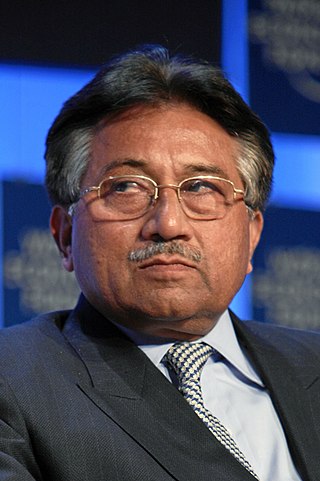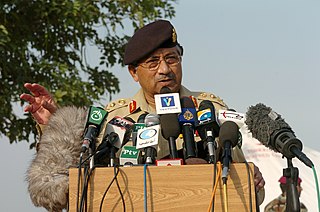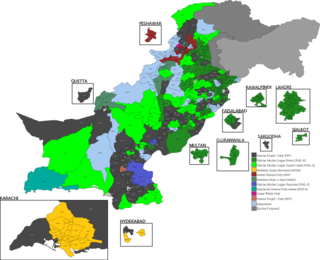
Pervez Musharraf was a Pakistani military officer and politician who served as the tenth President of Pakistan from 2001 to 2008.

The Pakistan Muslim League (N) (PML(N) or PML-N; Urdu: پاکستان مسلم لیگ (ن)) is a centre-right, conservative liberal political party in Pakistan. It is currently the third-largest party in the Senate and the largest in the National Assembly. The party was founded in 1993, when a number of prominent conservative politicians in the country joined hands after the dissolution of Islamic Democratic Alliance, under the leadership of former Prime Minister Nawaz Sharif. The party's platform is generally conservative, which involves supporting free markets, deregulation, lower taxes and private ownership. Although the party historically supported social conservatism, in recent years, the party's political ideology and platform has become more liberal on social and cultural issues; however, members have been accused of using Islamist populist rhetoric. Alongside the Pakistan Tehreek-e-Insaf (PTI) and Pakistan People's Party (PPP), it is one of the three major political parties of the country.

Makhdoom Muhammad Javed Hashmi, is a Pakistani politician, political realist, and a senior conservative thinker on the platform of Pakistan Muslim League (N).

Shaukat Aziz is a Pakistani former banker and financier who served as 17th prime minister of Pakistan from 28 August 2004 to 15 November 2007, as well as the finance minister of Pakistan from 6 November 1999 to 27 August 2004. He studied at St Patrick's High School, Karachi. Aziz graduated from the Institute of Business Administration in Karachi, and joined the corporate staff of the CitiBank Pakistan in 1969. He served in various countries' governments as CitiBank financier, and became executive vice-president of Citibank in 1999. After accepting a personal request by General Pervez Musharraf, Aziz returned to Pakistan from the United States to assume charge of the Finance Ministry as the finance minister while taking control of the country's economy. In 2004, Aziz was nominated by the Musharraf loyalist government, led by Pakistan Muslim League (Q), for the position of prime minister after the resignation of Zafarullah Khan Jamali on 6 June 2004.

The 1999 military takeover in Pakistan was a bloodless coup d'état initiated by the military staff at the Joint Staff HQ working under the Chairman of the Joint Chiefs of Staff Committee and Chief of Army Staff General Pervez Musharraf. The instigators seized control of the civilian government of the popularly elected Prime Minister Nawaz Sharif on 12 October 1999. On 14 October, General Musharraf, acting as the country's Chief Executive, issued a controversial provisional order that suspended the Constitution of Pakistan.
The 2006 Thailand coup d'état took place on 19 September 2006, when members of the Royal Thai Army staged a coup against the government of Prime Minister Thaksin Shinawatra. The coup, which is Thailand's first in fifteen years, followed a year-long political crisis involving Thaksin and political opponents and occurred less than a month before elections were scheduled to be held, on 15 October. The military postponed the upcoming elections, suspended the Constitution, dissolved Parliament, banned protests, suppressed and censored media outlets, declared martial law, and arrested Cabinet members. The coup was bloodless, with no casualties reported.

General elections were held in Pakistan on 18 February 2008 to elect members of the 13th National Assembly and the four Provincial Assemblies.
The Karsaz bombing attack occurred on 18 October 2007 in Karachi, Pakistan; it was an attack on a motorcade carrying former Prime Minister Benazir Bhutto. The bombing occurred two months before she was assassinated. The bombing resulted in at least 180 deaths and 500 injuries. Most of the dead were members of the Pakistan Peoples Party (PPP).

A state of emergency was declared by President of Pakistan Pervez Musharraf on 3 November 2007 which lasted until 15 December 2007, during which the Constitution of Pakistan was suspended. When the state of emergency was declared, Musharraf controversially held both positions of President and Chief of Army Staff. He later resigned as army chief 25 days into the emergency on 28 November. The state of emergency and its responses are generally attributed to the controversies surrounding the re-election of Musharraf during the presidential election on 6 October 2007, including his holding of both offices of President and Chief of Army Staff at the time.
Events from the year 1999 in Pakistan.

The assassination of Benazir Bhutto took place on 27 December 2007 in Rawalpindi, Pakistan. Benazir Bhutto, the former Prime Minister of Pakistan and then-leader of the opposition party Pakistan People's Party, had been campaigning ahead of elections scheduled for January 2008. Shots were fired at her after a political rally at Liaqat National Bagh, and a suicide bomb was detonated immediately following the shooting. She was declared dead at 18:16 local time, at Rawalpindi General Hospital. Twenty-three other people were killed by the bombing. Bhutto had previously survived a similar attempt on her life that killed at least 180 people, after her return from exile two months earlier. Following the event, the Election Commission of Pakistan postponed the general elections by a month, which saw Bhutto's party win.
International reactions to the assassination of Benazir Bhutto consisted of universal condemnation across the international community, including Pakistan's regional neighbors Afghanistan, China, India, Bangladesh, and Iran. Indian Prime Minister Manmohan Singh praised Bhutto's efforts for the improvement of India-Pakistan relations. The UN Security Council held an emergency meeting and unanimously condemned the assassination, a call echoed by UN Secretary-General Ban Ki-moon. Both European Union President José Manuel Barroso and U.S. President George W. Bush also expressed the hope that Pakistan will continue on the path of democracy.
Events from the year 2006 in Pakistan.
Events from the year 2007 in Pakistan.
Bhurban Accord was a political agreement signed by two of Pakistan's biggest political powers, the Pakistan Peoples Party (PPP) and the Pakistan Muslim League (Nawaz) (PML-N) and was signed by co-chairman of the PPP Asif Ali Zardari and PML-N leader Nawaz Sharif it was signed on 8 March 2008 in PC Bhurban in the province of Punjab.
The effort to impeach Pervez Musharraf was an August 2008 attempt by opposition parties comprising the Pakistan Peoples Party (PPP), Pakistan Muslim League (N) (PML-N), Awami National Party (ANP), and Jamiat Ulema-e-Islam to force Pakistan's President Pervez Musharraf out of office. On August 18, Musharraf announced his resignation.

Pakistan–Palestine relations refer to the bilateral relations between Islamic Republic of Pakistan and State of Palestine. The Palestinian Authority established an embassy in Islamabad on 31 January 2017. Pakistan remains a staunch supporter of the proposal for the creation of an independent Palestinian state, and in line with its pro-Palestinian doctrine, does not recognize the State of Israel. However, the former President of Pakistan, Pervez Musharraf, stated that Pakistan will recognize Israel's sovereignty if the latter withdraws its forces from the Israeli-occupied territories and allows an independent Palestinian state to be established within the Green Line that served as the international border between Israel and the Palestinian territories from the First Arab–Israeli War of 1948 to the Third Arab–Israeli War of 1967. Pakistan frequently provides various forms of humanitarian aid to the Palestinian Authority.

New Zealand–Pakistan relations refer to the international relations between New Zealand and Pakistan. Pakistan has a High Commission located in Wellington while New Zealand has an honorary consulate in Karachi. New Zealand was party to the Commonwealth Heads of Government decision to readmit Pakistan to the Councils of the Commonwealth after the restoration of civilian rule in May 2008.

The Imran Khan government was the government of Pakistan which was formed by Imran Khan following his successful election as Prime Minister of Pakistan by the National Assembly. The cabinet had 25 federal ministers, 4 ministers of state and 4 advisors, most of whom assumed office on 20 August 2018.
The Federation of Pakistan v. General (R) Pervez Musharraf, informally known as the Musharraf high treason case, was a court case, in which General Pervez Musharraf who acted in the capacity as chief of army staff, tried for high treason stemming from his imposing of unconstitutional state of emergency on 3 November 2007. In this act, Gen. Musharraf, who was also elected as President of Pakistan, subverted and suspended the writ of the Constitution of Pakistan, dismissing the fifteen justices of the Supreme Court of Pakistan and the fifty-six judges of the provincial High Courts while issuing arrest orders to Chief Justice of Pakistan.
 Afghanistan - Foreign ministry spokesman Sultan Ahmad Baheen said, "Security and stability in Pakistan directly affect the situation in Afghanistan and vice versa...We are following the situation in Pakistan with concern and very seriously. We want stability and peace in our neighbouring country." [1]
Afghanistan - Foreign ministry spokesman Sultan Ahmad Baheen said, "Security and stability in Pakistan directly affect the situation in Afghanistan and vice versa...We are following the situation in Pakistan with concern and very seriously. We want stability and peace in our neighbouring country." [1]  Bangladesh - Bangladesh Interim Foreign Minister Iftekhar Ahmed Chowdhury said, "As a friendly country, Bangladesh is observing the developments in Pakistan very closely. We view those events as their internal matter" "However, we hope that (it does) not lead to any kind of instability" [2]
Bangladesh - Bangladesh Interim Foreign Minister Iftekhar Ahmed Chowdhury said, "As a friendly country, Bangladesh is observing the developments in Pakistan very closely. We view those events as their internal matter" "However, we hope that (it does) not lead to any kind of instability" [2]  China - Chinese Foreign Ministry spokesman Liu Jianchao has issued the following statement: "We are concerned about the situation in Pakistan, and believe the Pakistani government and people are capable of solving their problems" [3]
China - Chinese Foreign Ministry spokesman Liu Jianchao has issued the following statement: "We are concerned about the situation in Pakistan, and believe the Pakistani government and people are capable of solving their problems" [3]  Hong Kong - The Security Bureau reminded Hong Kong residents travelling to Pakistan to pay attention to personal safety and keep themselves up-to-date on developments there. A spokesman for the bureau said the Hong Kong Government would continue to closely monitor the situation. [4]
Hong Kong - The Security Bureau reminded Hong Kong residents travelling to Pakistan to pay attention to personal safety and keep themselves up-to-date on developments there. A spokesman for the bureau said the Hong Kong Government would continue to closely monitor the situation. [4] 









